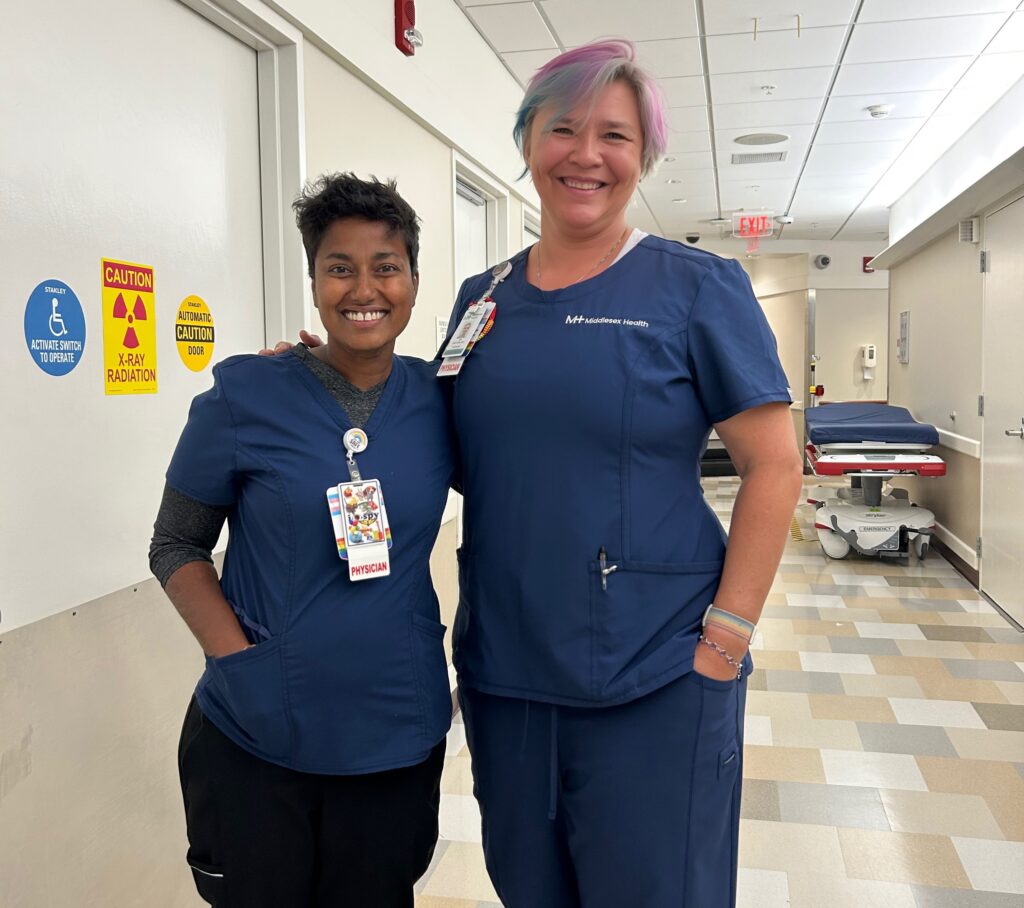By Jane Latus
If you can complete this sentence, you really need to read this article: “I dread seeking medical care because I’m worried I will be stigmatized and my care will be compromised because I’m (fill in your orientation/gender/color here.)
Two-thirds of LGBTQ+ people share that fear, according to a 2021 Center for American Progress survey. They’re not the only organization to identify the magnitude of this problem. In many other surveys, responders report disrespect and discrimination based on who they are.
From the refusal to respect your gender, to asking irrelevant and intrusive questions, to dismissing your same-sex partner accompanying you to the appointment … all these forms of discrimination are prohibited by federal law. However, many patients still worry—even in Connecticut—and it’s hard for them to feel secure.
Survey data also shows that for many reasons—ranging from lack of insurance to fear of discrimination—LGBTQ+ people are less likely to have a primary care doctor. Therefore, they are more reliant on emergency departments for what would otherwise be routine care.
As a result, planning for medical emergencies is even more important for LGBTQ+ people. Even though by definition you can never predict what kind of emergency it may be, there are several steps you can take to plan ahead.
Siri Daulaire, MD, and Sheeja Thomas, MD, are emergency medicine physicians at Middlesex Health, as well as members of the LGBTQ+ community, and they have some advice for you.
TO DO NOW
If you don’t have medical insurance, check with Access Health CT or the State of Connecticut Office of the Healthcare Advocate for free help finding a plan.
Familiarize yourself with your copays and which hospitals and urgent care clinics are in-network with your insurance plan. By law, all hospitals have to treat you in case of emergency, but your costs will be higher at an out-of-network hospital. Check on this each year, because networks are subject to change.
Check whether your insurance will cover telehealth appointments, for instances when you need answers or a prescription, but not stitches.
Figure out how to get to the emergency room, or urgent clinic, of your choice.
Think ahead about who you would ask to drive or accompany you, assuming you won’t need an ambulance. Have a backup support person, if possible.
Keep a current list of your medications and allergies in your wallet or on your smartphone.
If you have insurance and a primary care doctor, emergency department doctors really, really want you to see your doctor for non-emergencies, and before they become urgent. Otherwise, those whose lives are in danger are going to compete with your sinus infection for doctors’ time. “We’re not the place to go when it’s convenient; it’s for people who are dying,” says Daulaire.
On the other hand, she warns not to dismiss serious symptoms. “I’d rather people come in a million times with symptoms of something life-threatening, and I tell them, ‘You’re not dying,’ than have someone stay home with chest pain from a heart attack because they don’t think it’s an emergency.”
IN AN EMERGENCY
Call 911 if you have symptoms of a life-threatening emergency. Don’t call your best friend at work or your out-of-state son for an opinion on what to do. Call 911.
If your symptoms are manageable and you’re able to drive yourself or have someone drive you, decide whether you need a hospital emergency department (You seriously need care, soon.) or an urgent care clinic. (You’ll live, but can’t wait until your primary care doctor is available.)
Some hospitals, like Middlesex, post their emergency department wait times online. Dr. Thomas warns patients to take that with a grain of salt, because while you are on your way, a dozen others might arrive ahead of you.
If you choose to go to an urgent care clinic, before you leave, check their hours to make sure they’re open.
Even if you can drive yourself, take an ally with you, arrange for someone to meet you there or at least have them be there with you virtually with during a telehealth appointment.
Take a phone charger with a long cord.
WHEN YOU ARRIVE
Most hospitals have made their registration process more LGBTQ+-friendly. But if you aren’t asked, tell the staff your pronouns and gender. If your sexual activity might be relevant to your medical condition, be forthright about it.
When you register after arriving in one of Middlesex Health’s three emergency departments (in Middletown, Marlborough and Westbrook), you’ll be asked your preferred pronouns, your sex assigned at birth, your gender identity and your name.
You’re asked these questions not to be invasive, but so staff can provide both appropriate medical care and respect for individuals, say Thomas and Daulaire. Sometimes these questions are pertinent to your symptoms. Also, they help staff speak to you respectfully, with your correct name and pronouns. Importantly, doctors also don’t want to inadvertently out you in front of your family members in the waiting room, says Thomas.
If anything, the doctors say, it’s the registrars who occasionally get grief from cisgender people, confused by or objecting to being asked for their pronouns.
If medical staff misgender you, correct them. Daulaire says she hates to put that onus on the person being mistreated, but notes that most of the time, staff make the mistake unintentionally, and the only way to fix it is to bring it up.
WHEN YOUR IDENTITY MATTERS
Too many trans people report being asked by doctors about their reproductive anatomy when the matter at hand is clearly irrelevant. This possibility is one reason it’s good to have an ally with you as an advocate.
At Middlesex, all staff are trained to provide competent care to LGBTQ+ patients. Doctors Thomas and Daulaire (who, as noted, are members of that community) say that when they ask about your queer identity, it’s because it could be relevant to your health issue. “It’s all about your risk profile,” says Daulaire. In a gay man, pain and fever may be related to STDs or prostatitis. Daulaire orders pregnancy tests for people of all genders if they have a uterus. She won’t ask you these questions, she says, if you’re there because of a broken toe.
Thomas says that knowing a patient’s identities helps her to advocate for them even within their families—like the teenage trans girl whose parents kept using “he/him” pronouns. The girl was experiencing extreme stress. “I said to the parents, ‘You do know her preferred pronouns are she/her?’ This is precisely why she was there in the emergency department.”
SOME REASSURANCE
Both doctors say they’ve also been patients and know how stressful it can be. They also know being part of a marginalized minority sometimes makes patients feel even more stress. That’s why Middlesex caregivers go out of their way to reassure queer patients, they say.
Older patients, especially those near the end of life, and those who’ve kept their relationships closeted, tug at Daulaire’s heart particularly. She’s not content for a patient to introduce their partner as a “roommate” or “friend”. She’ll ask, “Is this your partner?”
“I need this person to be recognized as who they are to the patient,” she says. “Having a loved one who is acknowledged as your partner, as your support person, is really important.”
Daulaire says she tries to make queer patients comfortable even before words are spoken. When people see her pronoun badge, she says, it helps. So does her rainbow-colored hair.
Putting people at ease is hugely important to Thomas. “I’m a very short, queer, woman of color. I feel there are places in Connecticut that are very scary for me. I’m often the only brown person in the room.” Luckily for her LGBTQ+ patients, she says, “I guess I look queer enough. I walk into the room—and they have a certain idea of who Dr. Thomas is going to be—and they are often like, woah! I feel their relief.”
In September, Middlesex Health’s employee resource group, MH+ PRIDE, was named Out & Equal’s New Employee Resource Group Chapter of the Year. Co-chaired by Daulaire, MH+ PRIDE aims to create a welcoming, affirming, inclusive and safe environment for all Middlesex employees. Since its launch two years ago, MH+ PRIDE created pronouns badges that staff wear, and created a transgender resource guide as a tool for all employees. The group also works to improve care for LGBTQ+ patients. It has already helped, says Thomas. “It has really translated to the patients.”
Middlesex has received five consecutive “LGBTQ Healthcare Equality Leader” designations from the Human Rights Campaign The honor is based on the facilities’ policies and practices related to equity and inclusion of LGBTQ+ patients, visitors and employees.










More Stories
A Leader in Care for LGBTQ+ Communities: Meet Kenneth Abriola, MD
Transforming Sexuality: Handling Sexual Changes for Trans Folks
MHC’s “Let’s Face It” Program Expands Mental Health Awareness